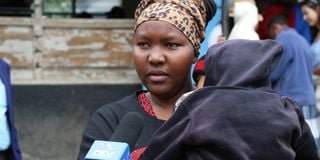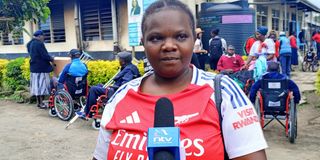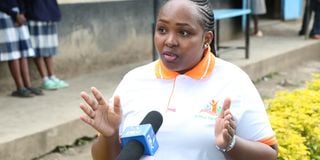“Left behind”: The struggles of parents raising and educating children with disabilities in Nakuru

Esther Wambui, whose seven-year-old son has cerebral palsy, talks about the stigma she faces from society and the shame she feels for not sending her son to school.
In some parts of Nakuru, the day does not begin with the sound of school bells, but with the quiet shuffle of mothers lifting their children into wheelchairs or onto their backs.
For these parents, raising and educating a child with disability is an ongoing demonstration of resilience, love and sacrifice. They face challenges ranging from unaffordable therapy sessions to a lack of inclusive schools and mobility aids.
Esther Wambui, a single mother from Kiamunyi, has spent years trying to enrol her seven-year-old son, who has cerebral palsy, in a school. Without a wheelchair, her son is unable to attend school.
"Each therapy session costs around Sh1,000 and we go three times a week. After paying for therapy, food, and diapers, there’s nothing left for school fees or a wheelchair," she says.
Her neighbours mock her for 'hiding' her child, failing to understand the financial and structural barriers she faces. “If I could afford a carer and a wheelchair, my son would have started school a long time ago,” she says.
For parents like Shamim Muthoni from Satellite Estate, the challenge lies in finding a school that can accommodate children with severe disabilities. Her five-year-old son, Sean Andrew, has cerebral palsy.
"There are a few schools for children with disabilities in Nakuru, but many are not equipped to handle cases that require full-time caregivers. Private schools cost around Sh75,000 per term, plus Sh20,000 for a carer," she explains.
For many families, this is unaffordable.

Sylvia Kwamboka, whose six-year-old son Emmanuel lost both legs, says that the government should enable all public schools to educate children with disabilities, in order to lessen the cost and burden of finding a school for children with different disabilities.
Sylvia Kwamboka from Lanet faces a different hurdle. Her six-year-old son, Emmanuel, lost both legs to gangrene shortly after birth. He attends Mlimani Primary School, which is an inclusive school where pupils with and without disabilities study together.
However, the daily commute of 15 kilometres and the lack of accessible facilities make schooling a real challenge. “Even at school, the toilets aren’t disability-friendly. Sometimes I go there just to help him change,” she says.
Nevertheless, she remains hopeful. "Education gives children like him dignity. It helps them see themselves as part of the world," she says.
Tabitha Wambui, a mother of eight from Bahati, says that enrolling her two adult sons at Nakuru Hill Special School has transformed their lives. "They can now feed and dress themselves. That’s progress,” she says, encouraging parents to seek disability certificates to access government support.

Peris Wangare, founder of the Arthur for Others Organisation and a parent of a child with cerebral palsy, explains how government systems are failing parents of disabled children to the extent that they cannot educate them.
However, according to Peris Wangare, founder of the Arthur for Others Organisation, around 90 percent of children with cerebral palsy in Nakuru remain at home. She says that special schools lack caregivers, therapy services and assistive devices.
"Wheelchairs cost between Sh40,000 and Sh65,000 and therapy is expensive. Government funding doesn’t cover these costs,” she says, urging the government to provide more subsidies and stronger support systems for schools.
Victoria Mulili, Nakuru County Director of Education, says the government is working to ensure that no child with special needs is left out.
"In partnership with chiefs, we conduct mop-up exercises to identify and enrol children with disabilities. Through the NEMIS system, funding for caregivers and assistive devices is allocated under the Free Primary Education programme," she says.


